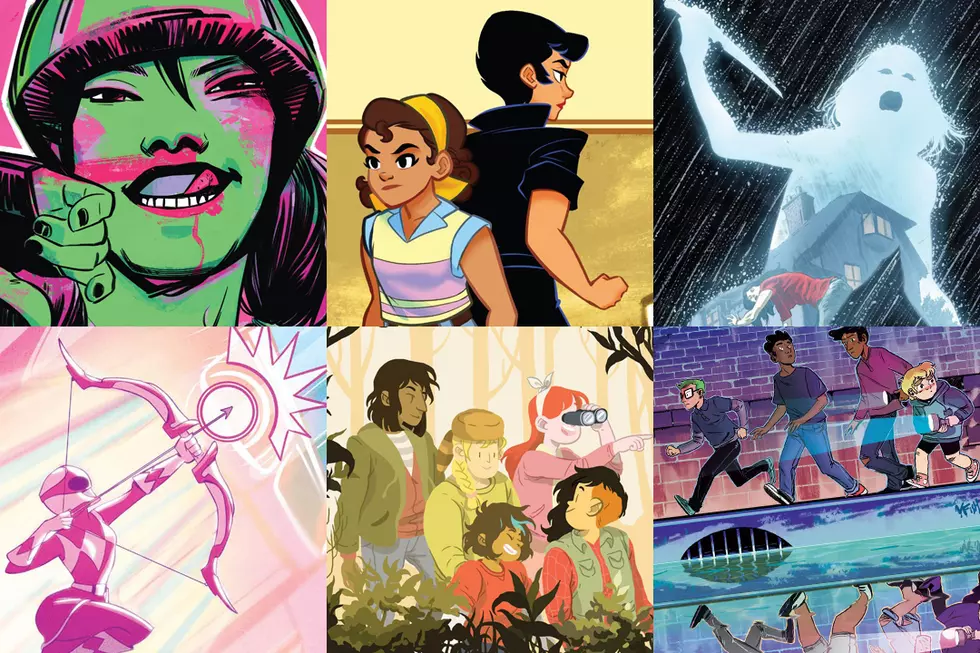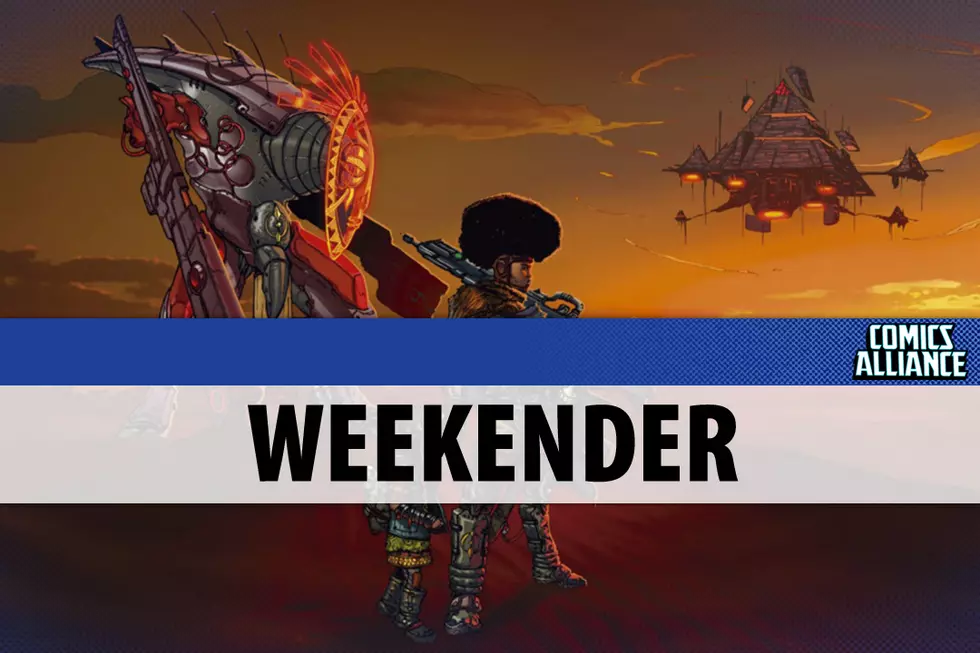![We’re Defining This New Wave Of Comics For Ourselves: A Conversation With Noelle Stevenson [Interview]](http://townsquare.media/site/622/files/2014/11/noelle-stevenson.jpg?w=980&q=75)
We’re Defining This New Wave Of Comics For Ourselves: A Conversation With Noelle Stevenson [Interview]
Noelle Stevenson is the future. Nimona, her celebrated and fantastical webcomic about a villain's shapeshifting sidekick, will be published as a graphic novel by HarperCollins in 2015; Lumberjanes, the Boom Studios series about a group of girl adventurers that she co-writes with Grace Ellis, has been promoted from miniseries to ongoing; Marvel has just announced that she's writing a story for the upcoming Thor Annual #1; and she's a writer on Disney’s Wander Over Yonder cartoon.
You're going to see a lot of Noelle Stevenson in the coming year. She's an outspoken, accomplished, and driven talent, and it's no surprise that everyone is suddenly taking notice. To better understand one of the industry’s most promising talents, ComicsAlliance sat down with Stevenson to talk about the indie scene, going legit, and the trials of a changing industry.
ComicsAlliance: You've wrapped up Nimona. What does it feel like to have a major independent project like that under your belt?
Noelle Stevenson: It's a relief! A little sad, of course, but ultimately satisfying. Especially since it's the first long-form story like this that I've ever finished. I'm just happy it's done, that I did what I set out to do. It's a good feeling.
CA: Having worked for major publishers now, what are the advantages to doing an independent webcomic? What are the advantages in working for someone else?
NS: I'm glad I got to start with something that was all me. You really get to figure out what it is that you gravitate to as a storyteller, and it also helps that it broadcasts to the publishers that have ended up hiring me what it is I gravitate to in a story!
Working for a publisher brings new challenges, but it's also not as hard. The pressure is intense when it's your own vision you're trying to articulate. There's a different kind of pressure when you're working within parameters, of course, but ultimately those borders can be comforting or even helpful in your growth.
There's stories I've worked on where maybe I didn't even know if I could do it, but then I did, and through that found something else that interests me, something I didn't know that I had before. I'm very lucky to have been given a lot of freedom in my career, but it's also fun to play in other people's playgrounds!
CA: Did you have any expectations for Nimona when you started it, or any goals in mind? Where you sitting there thinking, "Yes, this is going to published by HarperCollins," or, "Awesome, can't wait to see Nimona cosplayers running around"?
NS: I had no idea what Nimona was when I started it. It started as a couple of one- and two-page comics, and the more I thought about it, the more I wanted to give it a real shot.
I've always had a lot of story ideas rattling around in my head, but Nimona felt very tangible very early. I knew the ending. So I just started making more and more pages, and then I made it a webcomic, like, OK, I'm really gonna do this. I thought of it almost like an exercise, to prove I could do it. The HarperCollins thing wasn't even in my wildest dreams. I kind of had some ideas about Kickstarter, self-publishing, like a lot of webcomics do? But even that was far in the future.
I guess the fact that it was so experimental for me, that I didn't even know what my expectations were, helped a lot in actually making it. It can be very intimidating if you're doing it with some kind of tangible goal like that, like fame, or a publishing deal, or having cosplayers. I think that can distract you. What I was really excited about were the characters and the story, and so it was OK if maybe not too many people read it, you know? The story was the important part. And then everything else happened and I just went with it. That's the best way I know how to deal with things.
CA: Artists online are in a really interesting growth period right now, in that suddenly the "legitimate" world is paying attention, and webcomics, self-publishing, and crowdfunding aren't silly anymore. Suddenly, all of this has real weight to it, and can lead to real success.
And that's great, but there are growing pains for sure -- I'm thinking of James Sturm's recent comic for The Nib in particular, which highlighted the kind of anxiety and competition that springs from a big open field like this, and the controversy it inspired. How do you feel about this strange point the comics world is at right now? Its joys and its frustrations?
NS: I dunno, I think it's exciting. Webcomics are what got me into comics. It was a lot of people who weren't being paid much attention to by mainstream comics, and even alt comics didn't have much interest in female perspectives. It's no accident that so many webcomic protagonists are female -- there just wasn't much out there for people who wanted those stories.
I tend to bristle at people praising alt comics as some kind of perfect comics paradigm, because there's quite a lot of misogyny in its history as well. Like, in my first comics class, every single great comic creator we studied was male. Don't get me wrong, they were absolutely influential and important, they were absolutely skilled. But I think it's harmful to canonize them too much, or canonize their methods.
And that's what you see, with webcomics on the rise, and for the first time there's a huge percentage of female creators and they're succeeding. And I think if you canonize these masters of alt comics, it's easy to be like, "Oh, she's cheating, it's not fair," or, "Whatever, it's all commercial drivel anyway." You see that a lot, the scorn for the 'Tumblr style,' or for stuff that has a big female following.
I don't think that webcomics and Kickstarter and Patreon have made print comics obsolete by any means; god, no. If anything, we just have so many more paths to succeed. We're defining this new wave of comics for ourselves. How can you not see how exciting that is? There's no right or wrong way to do it.
That's why I like comics! They are limitless. There are people with webcomics who are pushing the limits of what comics can be -- Emily Carroll, Ava's Demon, etc. Some comics are made to be displayed digitally and it doesn't degrade them. And there are innovations happening in print comics too. Anyone resisting that, clinging to some kind of idea of a golden age that we're defiling somehow... well. That's what's becoming obsolete.
Also I think one of the big sore points that the Sturm comic inspired -- and honestly, the comic itself referenced this, so I think this may have been the point that it was trying to make -- is that this idea of competition isn't actually healthy for creativity. Someone else who succeeds isn't 'stealing' your success. You gotta keep your eyes on your own board and do the best you can. The more good stuff exists, the better we make the field, and the more people can succeed within it.
CA: You've become almost emblematic of that new style of creator -- the one who does her own thing, gains a following, gets noticed, and maintains a distinct voice all the way through. Boom Studios has been quicker to pick up on that kind of online talent than most, but now we're seeing other people catch on. You'll be doing work for Marvel, DC's hired Babs Tarr, etc. The industry in starting to notice online, social media-based, and often female talent.
What sort of change do you see this bringing about in the industry? Will the goal always be to "go legit" with a big publisher, or will we see new, more independent goals emerge alongside Marvel/DC/Image dreams? Will one eclipse the other or can they live in harmony?
NS: Honestly, to ignore the wealth of talent that is making stuff on the internet right now just because they're making stuff on the internet would be incredibly foolish. There are so many young and talented people who are posting on Tumblr, running webcomics, etc.
Boom is one of the first [publishers] to reach out to them, and shows like Adventure Time are hiring them, so there are a huge number of online creators in animation right now. And other companies are starting to catch on. Is it the endgoal to work for one of them? Heck no.
For me, I love it. I'm writing for Disney's Wander Over Yonder, I'm writing Lumberjanes, I'm writing for Marvel, and more projects that will be announced soon. I like it, I like to explore everything I can. I don't want any of them to own my soul or anything, obviously. But it's exciting for me to get to go from here to there, to try different things and push myself to new limits.
It's not everyone's goal and that is equally as legitimate. Some people were taken advantage of by big corporations, some people became too busy to work on their personal projects, some people had terrible experiences. There are some people who are completely happy with maintaining only their own work and projects, and I think that's great! And honestly very appealing in its own way. I don't think having one kind of career aspiration over another makes you any more 'good', or successful, or artistically pure. Either you'll get flack for being a sellout or flack for not having a 'real' job, but I don't care, people are making great work on both sides. I don't think it's necessarily a new thing either. But there's no right way to be a creator.
CA: When you think about long-term goals for yourself, as a comics creator, what do you envision? What legacy do you hope to leave?
NS: My approach hasn't really changed since I was first starting on Nimona. I find it absolutely paralyzing to take into account the far future, or have a planned-out life or career. I try to keep my expectations on the lower side of realistic, and so whatever happens will be okay. It keeps me excited. It's the little excitements that keep you going through the day.
There are so many possibilities. I mean, a year ago I would never have conceived of where I'd be right now, so I don't think I'm any closer to knowing where I'd be a year from now.
But in more general terms, I just want to tell stories. As long as I can tell stories I'll be okay. And for people to read those and connect with those and find out new things about the world and about themselves through those, I mean; that's it, right there. That's what matters. There's a lot of different forms that can take. But that's always gonna be the most important thing.
More From ComicsAlliance







![Boom Box Unveils New York Comic Con Exclusive Covers For ‘Lumberjanes’ And ‘The Backstagers’ [NYCC 2016]](http://townsquare.media/site/622/files/2016/09/Lumberjanes.png?w=980&q=75)

